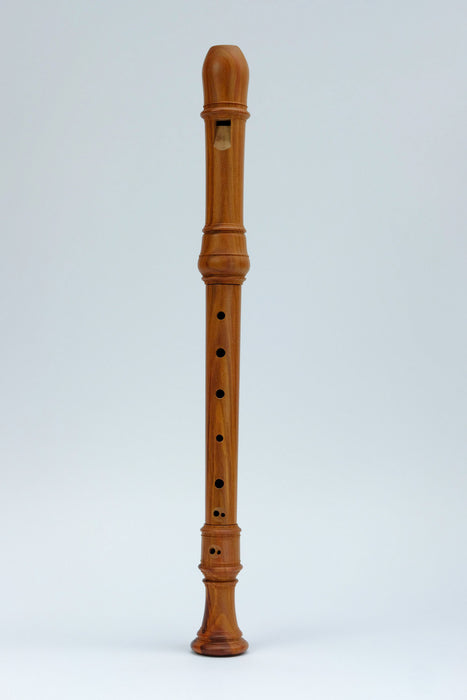
Recorder31 Day 10 | Benjamin Britten & The Recorder
It's time for some Recorder31 weekend reading, and we have a special piece for you today. Our Snape showroom, which opened in 2021, is situated on the same site as Snape Maltings Concert Hall, home of the Aldeburgh Festival. The festival was famously founded by Benjamin Britten in 1948 – but did you know that Britten had a soft spot for the recorder? Our Snape Retail Manager, Philip Reed, who is also a hugely knowledgable Britten scholar, picks up the story to tell us more...

Benjamin Britten was not only one the twentieth century’s most celebrated composers, chamber pianists and conductors, he was also an enthusiastic albeit amateur recorder player. He and his partner, the tenor Peter Pears, may have appeared together on some of the world’s most prestigious concert halls, but at home in Aldeburgh, only a few miles from The Early Music Shop’s Snape Maltings showroom, playing the recorder – both took it up – was music-making for fun.
Encouraged by their friend and colleague Imogen Holst, daughter of Gustav, composer of The Planets, Britten and Pears acquired a consort of wooden Dolmetsch recorders (soprano through to bass) in the early 1950s, instruments which today form part of the collection of Britten Pears Arts at the Red House, Britten and Pears’s former Aldeburgh home. Pears, a bassoonist while at school, naturally gravitated to the bass though he played the alto as well, while Britten tackled the soprano, alto and tenor. Photographs of his composition studio from the period show some of his recorders on his desk, ready to be picked up and played; and there are photographs and even some 8mm cine-footage (silent, of course) of them playing recorders whilst reclining in deck chairs in their garden.
That Britten took an interest in the recorder is hardly surprising. In the great resurgence of interest in the instrument during the 1950s, coupled to the ability to mass produce instruments relatively cheaply in plastic, the recorder was then being taught in schools across Europe, especially in the UK where the Dolmetsch company was based. Imogen Holst, herself a great animateur of amateur music-making, was then editing a series of recorder publications for Boosey & Hawkes (Britten’s publishers at the time) for which Britten acted as an unofficial advisor. And all three musicians – Britten, Pears and Holst – were involved in the Aldeburgh Music Club, an amateur collective of local musicians, in which a recorder consort was a key activity. (None of the professionals in the Club was permitted to perform on their main instrument, so Britten was therefore banned from the piano, and Pears was not allowed to sing.) Britten composed his Scherzo for recorder quartet in 1954 for the Aldeburgh Music Club, which was subsequently published in Holst’s series.
One of the Aldeburgh Music Club’s founding members was Britten and Pears’s close friend, the artist Mary Potter. In 1955, whilst on a ski-ing holiday in Zermatt with them, she injured her ankle and had to retire hurt from the ski slopes. To alleviate the tedium of the enforced rest while her friends skied each day, Britten promptly wrote a group of easy, short pieces – entitled Alpine Suite – for Mary to master. She had taken her Dolmetsch soprano recorder with her and could therefore practise Britten’s charming character pieces.
But these two short ensemble pieces were only the beginning as far as Britten and the recorder were concerned. For Noye’s Fludde, his 1958 operatic adaptation for professionals and amateurs of the Chester Miracle Play about Noah and his ark, Britten made extensive use of mass recorders in his score. He carefully tailors the recorder parts to accommodate absolute beginners as well as more accomplished players. More significantly, he writes an important solo alto recorder part for a professional player to represent the dove that Noah releases from the ark to discover if the flood waters have subsided. Two years later the recorder features as a solo instrument in Britten’s opera A Midsummer Night’s Dream, played on stage by one of Shakespeare’s fairies as part of the entertainment entitled ‘the tongs and the bones’, as Bottom calls them.
An unfulfilled recorder project, one which surely all recorder players must regret, is that Britten was approached by virtuoso Carl Dolmetsch, for a concerto for the instrument. Dolmetsch commissioned a whole contemporary repertoire for the instrument during his long career, including pieces from leading British composers such as Lennox Berkeley and Edmund Rubbra among many others. A concerto from Britten would have been a signal honour. But it was not to be. Britten’s composition schedule was always packed, and while he was genuinely interested in taking on this commission, available time within his other commitments ran out and it could not be achieved.
Britten’s interest in the recorder, as player and composer, was well known: in 1958 he was pleased to accept an invitation from the Society of Recorder Players to be their President, a position he happily retained until his death in 1976.
– Philip Reed
Retail Manager, The Early Music Shop, Snape Maltings
Would you like to see Britten's homeland in all its glory, and pay a visit to The Early Music Shop while you're in the area? Find out more about visiting us by clicking here, and about the other things to do at Snape Maltings by clicking here.
------------

The Sound of Recorder Music!
Earlier in the week we shared our Staff Picks and one of Philip's choices was this Küng Superio Alto in plumwood. This strong-toned recorder is part of this weekend's Awesome Altos collection which is discounted all weekend! Listen to the clips below or follow this link to find out more about this instrument.

Vivaldi La Notte:
Bach Sarabande:
Scale:


Leave a comment